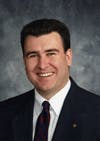Making the Leap from Manufacturing Manager to Consultant
When Chevron Corp. in early 1990 told Lonnie Wilson that he was being transferred from El Paso, Texas -- where Wilson was the technical manager of a Chevron refinery -- Wilson decided to retire and start his own consulting practice. For those following in his footsteps, though, Wilson recommends doing things a bit differently than he did.
"I did not have a desk. I did not have a client. I did not have a piece of letterhead," Wilson recalls. "All I had was an idea of what I wanted to do, and the fact that I didn't want to leave El Paso."
After a 20-year career with Chevron (IW 500/3), Wilson formed Quality Consultants in April 1990. Although the seeds of his consulting practice had been planted years before that when he became smitten with the teachings of W. Edwards Deming, the move still came as a shock to his friends and colleagues.
"Everybody thought I was patently insane, because the classic advice is never try and find a job unless you have one," Wilson says. "But I just started out cold turkey."
Things turned out OK in the end, though. Leveraging the relationships he'd established at Chevron and at a local community college -- where he taught classes on statistical process control and other topics -- Wilson quickly landed clients.
"The truth of the matter was my first year was extremely good," he says, "and my second year was as well."
Unfortunately, that hasn't been the case for Jeff Gotro.
A Passion for Plastics, Not Sales
Armed with a Ph.D. in materials science from Northwestern University and a passion for polymers, Gotro rose through the ranks at IBM Corp. (IW 500/10) and AlliedSignal (now Honeywell International [IW 500/37]), eventually ascending to vice president and chief technology officer at the former Ablestik Laboratories.
When Dusseldorf, Germany-based consumer-products maker Henkel AG purchased Ablestik in 2008, Gotro quips that he and other senior leaders were "given an opportunity to prosper elsewhere."
"And it was 2008 and I looked around and said, 'There's no VP jobs. I could work eight to 10 hours a day trying to find a job that doesn't exist, or I could work eight to 10 hours a day starting a company,'" Gotro recalls. "And I had to think about that for a nanosecond."
And InnoCentrix was born.
Gotro created a crisp-looking website and blog, enlisted the services of a top-flight team of consultants, and gave the firm a sharp focus: helping companies leverage polymers to grow and gain a competitive advantage.
Despite all that, the firm has struggled, so much so that Gotro lately has been considering looking for another corporate job.
Gotro says the biggest challenge has been the sales process -- closing deals when potential clients come calling.
"What I didn't realize is that you have to have a lot coming in, because you're not going to close 100% of the things that come to you," Gotro says. "Even as nichey as I am, I thought I was going to close everything that comes to me -- and I'm not."
Some prospects, he laments, are trying to get a proposal from him to compare against the proposal of a consultant that they've already hired. Others simply are seeking free consulting and "have no intention of purchasing from you."
Gotro also says he's been hurt by the flood of consultants entering the market during the recession.
"With so many people out of work, there were a lot of people who were doing a little bit of consulting on the side and they were coming in really low [on their price quotes] and they didn't realize how much money they were leaving on the table," he explains. "They put a big dent in the fee structure."
Gotro, a member of the Institute of Management Consultants, said he has talked to a number of other consultants who are in a similar boat.
"I poured my heart and soul into a company and it didn't really matter at all," Gotro says of his time with Ablestik Laboratories. "So I said, 'I'm just not doing that again.'
"So for me to consider going back to corporate America, things must be really bad."
A Son and Pop Shop
For Jason Piatt, consulting was the career opportunity of a lifetime.
An electrical engineer by trade, Piatt left his job at power-transmission-equipment maker TB Wood's Inc. to launch a consulting firm with his father, Jim, a retired utility executive.
In 1995, they formed Waynesboro, Pa.-based Praestar Technology Corp., which includes a division that provides lean/Six Sigma-focused consulting services and a division that makes electronic controls for equipment manufacturers.
"The idea of getting to work with him was a dream come true," Piatt says.
The father-son team discovered immediate synergies. Both were engineers by trade with "multiple advanced degrees," doing business in a manufacturing-rich area. Jim had experience in executive management, while Jason had a 360-degree view of a manufacturing operation, having worked in a variety of functions.
Meanwhile, Jason, a business professor at Penn State University, brought valuable teaching skills to the table.
"So we had a skill set that was pretty marketable and not really readily available in the marketplace," Jason Piatt says. "When you have that kind of intersection, it was like the perfect storm of a market opportunity for us.
"And we are extremely focused -- we only work with manufacturers."
His father passed away in 2003, but their company lives on, with a contingent of more than 40 consultants, most of whom work on a part-time or contract basis.
While Piatt, of course, cherished the time he was able to spend working side-by-side with his father, he was surprised by how much he enjoyed consulting.
"I was never the kid who had the lemonade stand on the street corner trying to start a business at the age of 5," Piatt admits. "For me, I tend to want to advance very quickly, learn as much as I want and as much as I can kind of unbounded. In a structured manufacturing environment, I found that I wasn't necessarily free to do that.
"When I transitioned to consulting, I was extremely rewarded for learning as much as I could as fast I could. So the reward and the work really went hand-in-hand for me."
'Aha!' Moments
Wilson believes that consulting is his true calling. He still gets a thrill out of sharing his knowledge of lean manufacturing principles -- and creating "aha!" moments for his clients when they "really see the power of lean and what they can do and how they can impact other people's lives."
"I've worked very hard at my trade," Wilson says. "But the other part of it is the good Lord has just blessed me with a couple things that make this fun and maybe even easy for me to do."
This is Part 1 in a two-part series. In Part 2, former manufacturing managers offer tips and best practices on how to transition from manufacturing to consulting.
About the Author
Josh Cable
Former Senior Editor
Former Senior Editor Josh Cable covered innovation issues -- including trends and best practices in R&D, process improvement and product development. He also reported on the best practices of the most successful companies and executives in the world of transportation manufacturing, which encompasses the aerospace, automotive, rail and shipbuilding sectors.
Josh also led the IndustryWeek Manufacturing Hall of Fame, IW’s annual tribute to the most influential executives and thought leaders in U.S. manufacturing history.
Before joining IndustryWeek, Josh was the editor-in-chief of Penton Media’s Government Product News and Government Procurement. He also was an award-winning beat reporter for several small newspapers in Northeast Ohio.
Josh received his BFA in creative writing from Bowling Green University, and continued his professional development through course-work at Ohio University and Cuyahoga Community College.
A lifelong resident of the Buckeye State, Josh currently lives in the Tremont neighborhood of Cleveland. When the weather cooperates, you’ll find him riding his bike to work, exercising his green thumb in the backyard or playing ultimate Frisbee.



